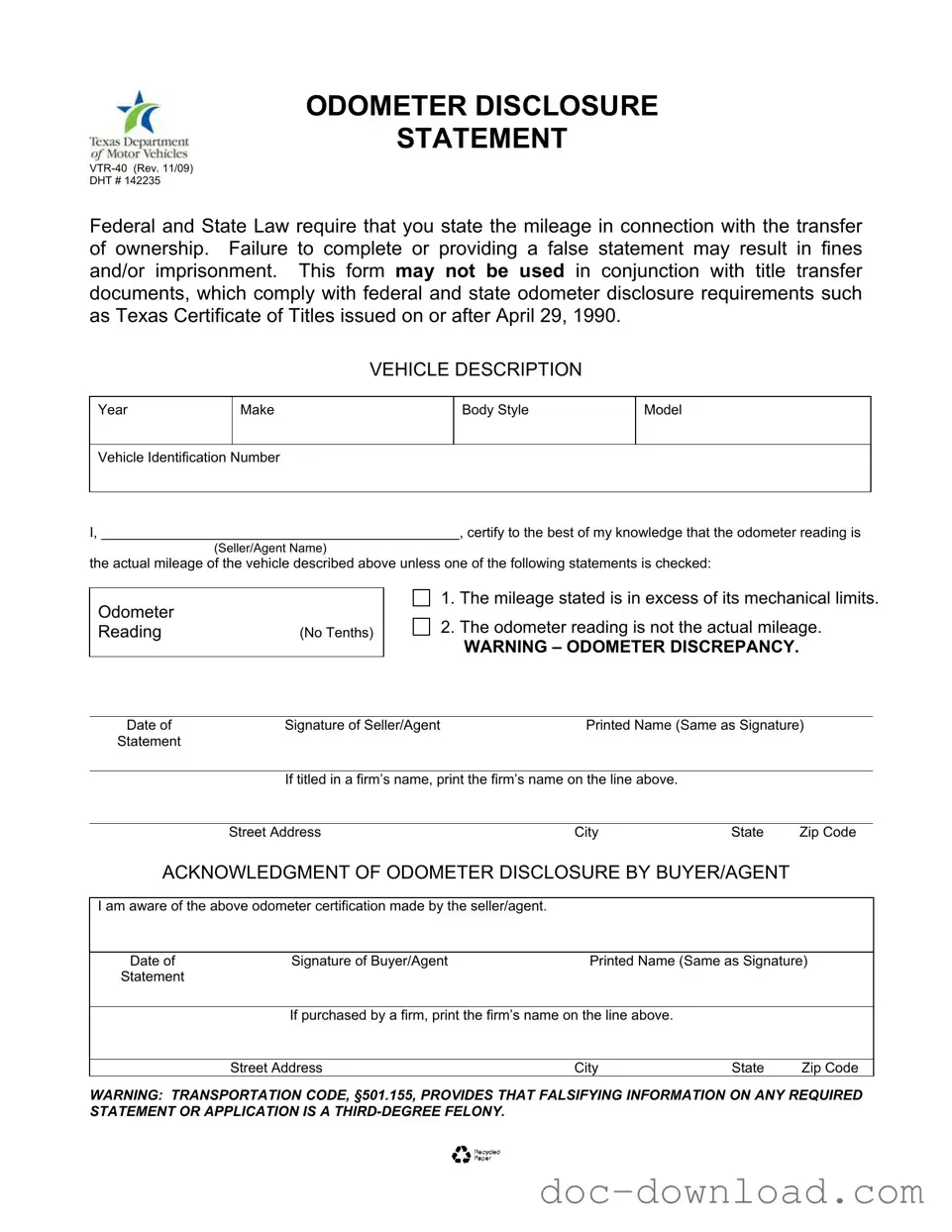Fill Out Your Texas Odometer Statement Template
The Texas Odometer Statement form, officially known as VTR-40, plays a crucial role in the vehicle transfer process, ensuring transparency and accuracy in mileage reporting. This form is mandated by both federal and state laws, which require sellers to disclose the vehicle's mileage when ownership changes hands. Notably, failing to complete this form accurately or providing false information can lead to serious consequences, including fines and potential imprisonment. The form is specifically designed for use in transactions that do not involve title transfer documents that already meet federal and state odometer disclosure requirements, particularly those issued on or after April 29, 1990. Essential details, such as the vehicle's year, make, model, body style, and Vehicle Identification Number (VIN), must be clearly stated. The seller certifies that the odometer reading reflects the actual mileage, unless certain conditions apply, such as the mileage exceeding mechanical limits or the odometer reading being inaccurate. Both the seller and the buyer must acknowledge their understanding of this disclosure, with signatures and contact information provided to ensure accountability. It is important to note that falsifying information on this form is classified as a third-degree felony under Texas Transportation Code §501.155, underscoring the significance of honesty in vehicle transactions.
Similar forms
The Texas Odometer Statement form is similar to the Federal Odometer Disclosure Statement, which is required for vehicle sales across the United States. Both documents serve the same purpose: to disclose the mileage of a vehicle at the time of sale. This federal form also mandates that the seller certifies the accuracy of the odometer reading, ensuring that buyers are informed about the vehicle's true mileage. Just like the Texas form, failure to provide accurate information can lead to significant legal consequences.
The Colorado Mobile Home Bill of Sale is essential for anyone involved in the sale or purchase of a mobile home in the state. This legal document not only facilitates the transfer of ownership but also ensures that both parties have a clear understanding of the transaction. For those looking for a comprehensive resource, Colorado PDF Forms offers accessible options to obtain and complete this important paperwork, safeguarding the interests of both sellers and buyers.
Another document that shares similarities is the Vehicle Title Application. This form is used when applying for a new title after purchasing a vehicle. It requires the seller to provide the odometer reading as part of the application process. Both forms emphasize the importance of accurate mileage disclosure, as this information is crucial for determining the vehicle's value and history. Additionally, both documents are subject to scrutiny, and inaccuracies can lead to penalties.
The Bill of Sale is another important document that parallels the Texas Odometer Statement. This document serves as a receipt for the transaction and often includes the odometer reading as part of the sale details. Just like the Texas form, the Bill of Sale provides a legal record of the transaction and ensures that both parties acknowledge the vehicle's mileage. Including this information helps protect both the buyer and seller from potential disputes regarding the vehicle's condition and value.
The Vehicle Registration form also bears resemblance to the Texas Odometer Statement. When registering a vehicle, the owner must provide the odometer reading to the state. This requirement helps maintain accurate records of vehicle mileage across the state. Similar to the odometer statement, providing false information on the registration form can lead to legal repercussions, underscoring the importance of honesty in these transactions.
The Manufacturer's Certificate of Origin (MCO) is another document that is similar in purpose. This document is issued for new vehicles and includes the odometer reading as part of the initial sale from the manufacturer to the dealer. Both the MCO and the Texas Odometer Statement aim to ensure that accurate mileage is documented from the very beginning of a vehicle's life. This helps prevent issues related to odometer fraud later on.
The title transfer document is also closely related to the Texas Odometer Statement. When a vehicle changes ownership, the title transfer must include the odometer reading. This requirement is in place to protect buyers from purchasing vehicles with altered or inaccurate mileage. Both documents serve as a safeguard against fraud and help maintain transparency in vehicle sales.
The DMV Odometer Disclosure Statement is another form that serves a similar function. Used in various states, this document requires sellers to disclose the odometer reading at the time of sale. Like the Texas Odometer Statement, it is designed to protect buyers from potential fraud and ensure that they are aware of the vehicle's true mileage. Both forms require the seller's signature, affirming the accuracy of the information provided.
The Affidavit of Odometer Disclosure is also comparable to the Texas Odometer Statement. This document is often used in situations where the original odometer disclosure is missing or incomplete. It allows sellers to provide the necessary mileage information under oath. Both forms emphasize the importance of honesty and accuracy, as providing false information can lead to serious legal consequences.
Lastly, the Odometer Reading Certification form is similar in that it is used to certify the mileage of a vehicle during a sale. This form, often used in conjunction with other documents, requires the seller to provide an accurate odometer reading. Both the certification form and the Texas Odometer Statement aim to protect buyers and ensure that all parties are aware of the vehicle's mileage history, thus helping to prevent disputes and fraud.
Form Specifications
| Fact Name | Details |
|---|---|
| Form Title | The form is called the Odometer Disclosure Statement, designated as VTR-40. |
| Legal Requirement | Both federal and state law require the disclosure of vehicle mileage during ownership transfer. |
| Consequences of Inaccuracy | Providing false information on this form may lead to fines or imprisonment. |
| Governing Law | This form is governed by the Texas Transportation Code, §501.155. |
Different PDF Templates
How to Make a Gift Certificate - A straightforward way to ensure your gift is appreciated.
A Georgia Quitclaim Deed is a legal document that allows a property owner to transfer their interest in real estate to another party without making any guarantees about the title. This form is often used among family members or in situations where the parties know each other well. To ensure a smooth transfer, consider filling out the form by clicking the button below or visiting https://quitclaimdeedtemplate.com/georgia-quitclaim-deed-template.
How to Get Your Marriage Certificate - The certificate signifies a legally recognized partnership with shared rights.
Sample - Texas Odometer Statement Form

ODOMETER DISCLOSURE
STATEMENT
DHT # 142235
Federal and State Law require that you state the mileage in connection with the transfer of ownership. Failure to complete or providing a false statement may result in fines and/or imprisonment. This form may not be used in conjunction with title transfer documents, which comply with federal and state odometer disclosure requirements such as Texas Certificate of Titles issued on or after April 29, 1990.
VEHICLE DESCRIPTION
Year
Make
Body Style
Model
Vehicle Identification Number
I, ______________________________________________, certify to the best of my knowledge that the odometer reading is
the actual mileage of the vehicle described above unless one of the following statements is checked:
Odometer
Reading |
(No Tenths) |
1.The mileage stated is in excess of its mechanical limits.
2.The odometer reading is not the actual mileage.
WARNING – ODOMETER DISCREPANCY.
Date ofSignature of Seller/AgentPrinted Name (Same as Signature) Statement
If titled in a firm’s name, print the firm’s name on the line above.
Street Address |
City |
State |
Zip Code |
ACKNOWLEDGMENT OF ODOMETER DISCLOSURE BY BUYER/AGENT
I am aware of the above odometer certification made by the seller/agent.
Date of |
Signature of Buyer/Agent |
Printed Name (Same as Signature) |
Statement |
|
|
If purchased by a firm, print the firm’s name on the line above.
Street Address |
City |
State |
Zip Code |
WARNING: TRANSPORTATION CODE, §501.155, PROVIDES THAT FALSIFYING INFORMATION ON ANY REQUIRED STATEMENT OR APPLICATION IS A
